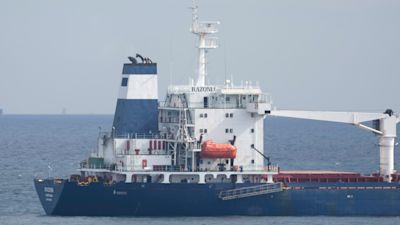First shipment of Ukrainian grain since war began ‘to arrive in UK in 10 days’

The first shipment of Ukrainian grain to the UK since Russia invaded in February is expected to arrive in 10 days, western officials have said.
It comes after a deal was bridged with Russia to allow critical food supplies to flow to millions of impoverished people facing hunger worldwide.
A UN-brokered agreement allowed the first grain shipment to be cleared for travel this week, with the Sierra Leone-flagged Razoni carrying corn and entering the Bosphorus Strait on the way to Lebanon on Wednesday.
Speaking about the newly re-established Ukrainian grain exports, a western official said the Malta-flagged Rojen is “due to arrive in the UK on August 14."
“This will almost certainly be the first shipment from Ukraine to arrive in the UK since the end of February and the start of the invasion,” they said.
The bulk carrier is expected to travel from the Port of Chornomorsk in Ukraine, where it is thought to be berthed and loaded on its way to the UK, but the official could not say which UK port is expected to receive it.
However, according to the VesselFinder website, the ship is due to arrive in Teesport on August 17.
The cargo is “probably corn or grain”, the official said, adding: “What it does show is that there is – which perhaps people don’t realise – direct supply of agricultural produce to the UK from Ukraine.”
The official added: "It is almost certain the success of its transit will result in more frequent transits.”
But, “clearing the backlog caused by the blockade that’s been in place since February will almost certainly remain a major logistical challenge," they said.
The official also played down fears over the state of Europe’s largest nuclear power plant, located in the south-eastern Ukrainian city of Enerhodar, and currently held by Russia.
UN nuclear chief Rafael Grossi said on Wednesday that the Zaporizhzhia power plant “is completely out of control," issuing an urgent plea to Russia and Ukraine to quickly allow experts to visit the complex to stabilise the situation and avoid a nuclear accident.
“In terms of the safety security of that site at the moment, whilst it is degraded in terms of normal operating levels, it is still functioning and functioning effectively,” the western official said.
“These aren’t the ideal industrial circumstances, but nevertheless I think the circumstances are better than painted in the media.
“Nuclear power plants are designed to withstand terrorist attacks, including aircraft hitting reactors etc, so please don’t think that we are looking at a Chernobyl-like situation. That’s not the case,” they added.
They said Russia may use the site as a “safe zone from which to carry out defensive operations," but that, while Ukraine will “consider very carefully how to avoid taking major risks around the site," it should not prevent a Ukrainian advance.
Want a quick and expert briefing on the biggest news stories? Listen to our latest podcasts to find out What You Need To Know
The official also cast doubt on Russia’s explanation of a deadly incident at a jail housing prisoners of war in the separatist region of eastern Ukraine.
Russia has claimed that Ukraine’s military used US-supplied rocket launchers to strike the prison in Olenivka, a settlement controlled by the Moscow-backed Donetsk People’s Republic.
“We assess it is not a high explosive attack from the outside, it’s not a Himars (High Mobility Artillery Rocket System),” the western official said, adding that that is “clear” from photographic evidence, citing as an example an image showing bunkbeds still standing which otherwise “would not be the case."
They added: “We think it’s more likely some sort of incendiary, some sort of implosion.”
Addressing the wider outlook of the war, the official said: “We think that Russia has not given up on its maximalist objectives for Ukraine ... militarily we question how they can achieve those objectives in the near term.
“But then what we need to understand better is Russia is prepared, I think, to operate over a much longer timeframe than we think in typically.”